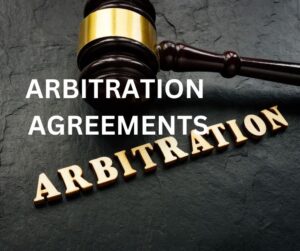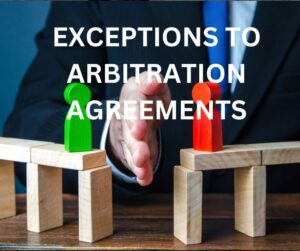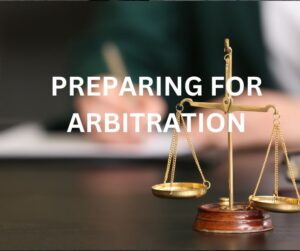Arbitration agreements are commonplace in a variety of contracts, from employment agreements to consumer services and beyond. By signing one, parties typically agree to resolve disputes through arbitration rather than through traditional court litigation. This can lead to questions about whether any legal rights to sue have been waived by signing such an agreement. This blog post explores the implications of signing an arbitration agreement, examining whether you can still pursue a lawsuit, under what conditions, and how these agreements operate.
Understanding Arbitration Agreements

What is an arbitration agreement?
It’s crucial for individuals and businesses to understand what signing this agreement means for their legal rights and dispute resolution options. Arbitration involves a neutral third party, known as an arbitrator, who reviews the evidence and arguments from both sides and then makes a binding decision. This process can be less formal than court proceedings and can be tailored to the needs of those involved.
For anyone who has signed or is considering signing a contract with an arbitration clause, it’s advisable to carefully review the terms with a business attorney. Understanding the scope and implications of the clause can help in making informed decisions and preparing for how disputes will be handled.
Is Arbitration a Lawsuit?
No, arbitration is not a lawsuit. It is an alternative dispute resolution (ADR) method where disputes are settled outside of court by an arbitrator or a panel of arbitrators. Unlike a lawsuit, which involves a judicial process within the court system, arbitration is typically less formal, quicker, and can be more cost-effective. Decisions in arbitration, known as awards, are generally binding and enforceable in the same manner as court judgments.
Legal Effects of Signing an Arbitration Agreement
By agreeing to arbitration, parties often benefit from a quicker resolution to disputes and a more private procedure. However, the binding nature of arbitration agreements means that the ability to take disputes to court is generally limited, potentially affecting how parties can seek remedies.
Does signing an arbitration agreement completely remove my right to sue?
While arbitration agreements are generally enforceable, they do not absolutely eliminate the possibility of going to court. These agreements typically mean that arbitration is the first recourse in resolving a dispute, but certain circumstances, such as procedural irregularities in the arbitration process or an arbitrator’s conflict of interest, can still lead to court interventions.
If you find yourself bound by an arbitration agreement yet feel the issue at hand might warrant a different approach, consulting with an attorney is critical. They can provide clarity on whether your specific situation might still allow for court proceedings based on the details of the arbitration agreement and the nature of your dispute.
Exceptions to Arbitration Agreements

Are there any circumstances under which an arbitration agreement can be overridden?
Yes, certain legal principles can render an arbitration agreement unenforceable. For instance, if an agreement is found to be unconscionably one-sided or if there has been fraud involved in the formation of the contract, the arbitration clause may be invalidated. Additionally, if the scope of the arbitration clause does not cover the type of dispute that has arisen, parties may still have the right to take the matter to court.
When Are Arbitration Agreements Not Enforceable?
It’s important for parties to document any questionable circumstances surrounding the signing of an arbitration agreement or the context in which it was agreed upon. Should you believe that an arbitration agreement you signed is unjust or overly burdensome, gather all relevant communications and contract drafts and discuss these with a legal professional to evaluate the viability of challenging the clause.
The Arbitration Process Explained
Understanding the arbitration process is crucial for anyone who has signed an arbitration agreement. Knowing what to expect can help in effectively navigating disputes and ensuring that your interests are adequately represented.
What does the arbitration process involve?
Arbitration typically begins with the selection of an arbitrator, which can be an individual or a panel, depending on the agreement. Both parties present their case, including evidence and witnesses, in a hearing that is less formal than court proceedings. The arbitrator then issues a decision that is binding and enforceable in court, similar to a judge’s ruling.
Preparing for arbitration involves gathering all pertinent evidence and documentation related to the dispute. It also may require finding legal representation experienced in arbitration to ensure that your case is presented effectively. Understanding the arbitrator’s method and any potential biases or backgrounds that might influence the arbitration is also crucial.
How to Prepare for Arbitration

How can I best prepare if my dispute goes to arbitration?
Begin by thoroughly documenting the facts of the case and gathering any relevant contractual agreements, communications, and records that support your position. Consider consulting with a lawyer who specializes in arbitration to help formulate a strong argument and to navigate the arbitration process effectively.
Ensure that all communications and transactions with the other party are well-documented and that you understand the legal grounds of your dispute. Engaging a lawyer with specific expertise in arbitration can provide you with the necessary guidance to approach the process strategically.
Arbitration Agreement FAQ
How can I get out of an arbitration clause?
Find Arbitration Law Firm Near Me
While arbitration agreements generally bind parties to resolving disputes outside of court, there are exceptions and specific circumstances under which these agreements can be challenged or deemed unenforceable. Understanding your rights and the specifics of the arbitration clause you have agreed to is crucial. Whether preparing for arbitration or considering challenging an arbitration agreement, professional legal advice is invaluable.
Contact our Houston Office
Call P. Bates Law, PLLC
If you’re unsure about the implications of an arbitration agreement you’ve signed or are facing a dispute that might head to arbitration, call our law firm now. An experienced attorney can provide the necessary guidance to navigate this complex area and help protect your rights effectively.
